This is Aztec Basketball
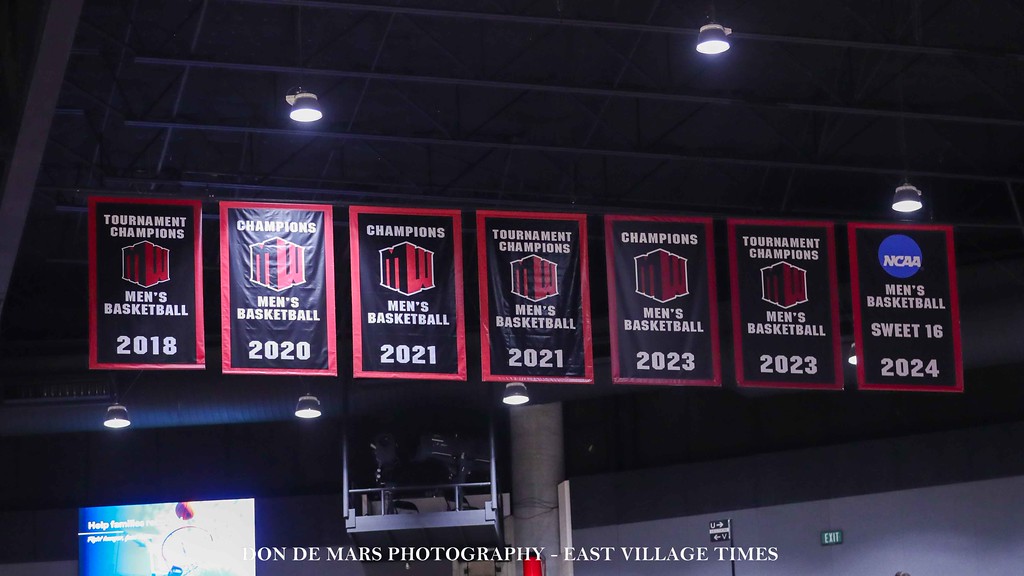
SDSU hung another banner on Wednesday. This time, it was from the 2023 Sweet Sixteen run. (Don De Mars/EVT)
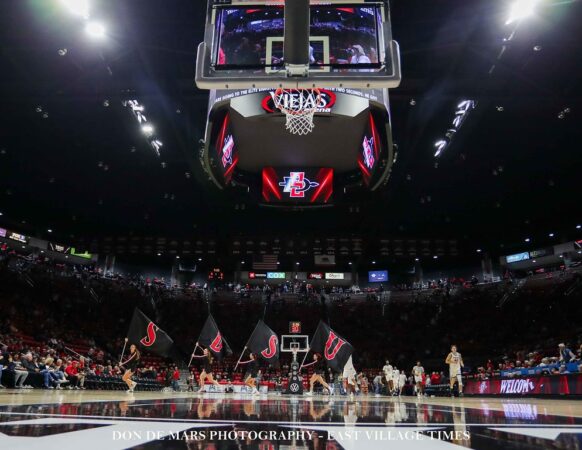
About five minutes before the tip of the season opener against UCSD, the video boards took Aztec Nation on a trip down memory lane.
Beginning with the court storming at the 2002 Mountain West Championship, clips etched in SDSU lore ran, forming a powerful vignette of the program’s prowess. Highlights included Kawhi Leonard’s game-sealing steal and dunk against Temple in the 2011 Round of 32, a moment from the improbable 19-1 run to win the 2014 regular season title over New Mexico, Malachi Flynn’s game-winner against San Jose State, and Lamont Butler’s buzzer-beater to send the team to the NCAA Championship Game.
“This is Aztec Basketball,” scrolled across the screen at the conclusion.
Wednesday night, San Diego State opened its 2024-2025 season. The heritage of SDSU basketball was everywhere.
The program unveiled another Sweet Sixteen banner. Fans sat to the top of the seating bowl all around Viejas Arena. The Show performed in the Madhouse on The Mesa spotlight. World-class athletes competed with the defensive intensity the program was built upon.
“It’s just incredible to see the energy at Viejas,” Jared Coleman-Jones said after his first regular season game at SDSU. “All over the country, you have places that bring this home court intensity. I came to Viejas, and I’m not even going to lie to you, it’s unmatched.”
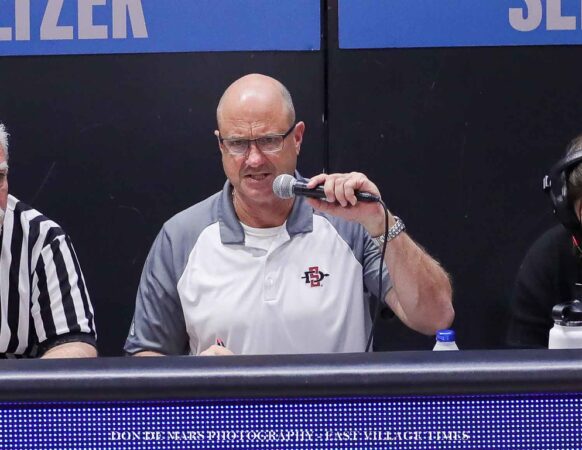
Wednesday, the genesis of a new catchphrase emerged from PA announcer Daren Sparks. Joining memorable bellows like “Deee Jaaaay Gaaaay” and “Jooordaaan Schakel,” some variation of “Blocked by Gwath” promises to be a fan favorite. Sparks had lots of opportunities to use his creation. Magoon Gwath had three first-half blocks.
Like many past iterations, this Aztecs’ team lacked cohesion on offense. Even with a wide-open scheme and lots of spacing, their 24-22 halftime lead resembled a rock fight more than a well-choreographed symphony.
Dutcher explained postgame against Cal State San Marcos that he would give equal opportunity early in the season. Whichever players did more with it would earn a bigger share moving forward. Without established roles, the scheme did not flow well.
A similar dynamic played out last season against the Tritons. Jaedon LeDee’s lay-up at the buzzer elevated the Aztecs to a 63-62 win. It was LeDee’s 13th point of the game. Micah Parrish led SDSU with 15. Soon after that December 1 contest, Dutcher gave the offense its LeDee-centered structure that they rode to the Sweet Sixteen. This season’s team is working through a similar evolution.
“I think if we play as hard as we play, we’re going to play a lot of players because we expect them to play hard at the defensive end and not rest on defense,” Dutcher said. “We’re not that dynamic offensively where we’re going to say, ‘let’s just sit in a 2-3 zone and race them to 100.’ We’ve got to get stops, so we ask them to pick up full court, turn the ball and pressure, and get to their gaps, and they get tired. So, you can’t play eight guys the way we play. We’ve got to be deep, and I think if you look over my eight years, we’ve been pretty deep. I play a lot of players.”
With 7:26 left, UCSD took its second-largest lead of the night at 50-45. Like many contests throughout the years, the Viejas crowd willed the home team to victory. SDSU raised its record in America’s Finest City to 214-26 since the 2009-2010 season. The Aztecs’ 89.2 winning percentage at home during that span is the fifth highest in the country, just ahead of Arizona.
Wayne McKinney III attended Coronado High School and was in the building during his prep career to take in the spectacle that SDSU basketball has become. In his first game since transferring from USD, he lived out the dream of many children who have sat in the arena over the years.
Nursing a 51-50 lead, McKinney pressured Tritons guard Aniwaniwa Tait-Jones as he brought the ball past half-court. As the 2023-2024 Big West Newcomer of the Year attempted a pass to his right, McKinney stole the ball and raced the other way. Tait-Jones fouled McKinney’s layup on the other end for an “and-1.”
As the hometown hero lay sprawled on the floor, the roar in the building reached its crescendo on the night.
This is Aztec basketball.
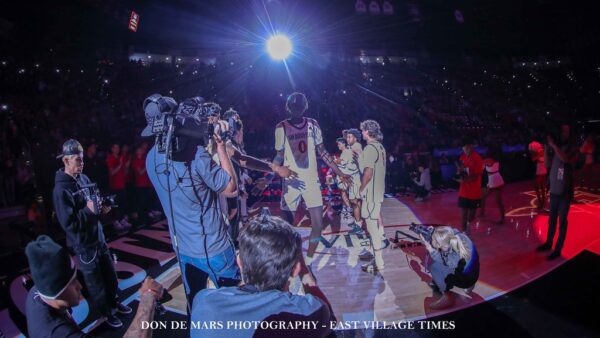
What the Victory Means
Postgame, Dutcher emphasized UCSD’s skill. He said the Tritons will challenge for a Big West title and a spot in the NCAA tournament. UCSD ran its schemes at a much higher level than SDSU, but ultimately, the Aztecs’ superior talent won out.
The Red and Black were fortunate to hold a 24-22 halftime lead. Dutcher said the Tritons surprised the Aztecs by playing a matchup zone extensively. He pinpointed this tactic for SDSU’s inability to score in one-on-one situations. SDSU’s head coach explained that the experience will serve the team because his athletes will learn from it.
Offensively, the Tritons excelled at sending passes to the opposite side of the court in the opening 20 minutes. They generated more open threes than are typical against SDSU’s defense.
UCSD missed most of them, shooting 4-17 from deep in the first half. The Aztecs adjusted after intermission, reducing the number of good looks. UCSD hit 6-9 over the final twenty minutes. From a defensive perspective, the performance was far better in the second half than the first, despite the better outcome for the Tritons.
In the context of the season, the victory could be a resume-builder if UCSD plays well this year. The Aztecs might be the most formidable team on the Tritons’ regular season schedule. The win was necessary with potentially four straight contests against ranked opponents coming up beginning on November 18 against Gonzaga. Its most significant impact, however, was SDSU finding success with a four-guard lineup at the end of the game.
As he had in the exhibition against Cal State San Marcos, Dutcher started two bigs in Gwath and Coleman-Jones. Behind them, Miles Heide and Pharaoh Compton competed. Some combination of those four played together for the first 29:10 of the game.
UCSD forced Dutcher to call a timeout with 10:50 left in the game after taking a 43-40 lead. He substituted Byrd for Heide to utilize the type of smaller, four-guard lineup he’s had success with during his tenure. The Aztecs outscored the Tritons 22-12 until Hayden Gray hit a meaningless three (except in analytics equations) with three seconds left.
“We played a four-guard lineup, which we’re going to do some this year. … We thought our best chance in this game against zone was to be small. We took our chances and stayed small, and that was one of the reasons we were able to generate enough offense to win the game,” Dutcher explained.
Key to this tactic is a versatile wing that can rebound well. Dutcher identified Byrd and Taj DeGourville as a potent pair in this role. Byrd (eight) and DeGourville (three) had only four fewer combined boards than Gwath (one), Heide (two), Compton (three), and Coleman-Jones (nine). The bigs also had seven of SDSU’s first nine turnovers. The Aztecs only scored 22 points in the paint.
There are taller teams on SDSU’s future schedule that will likely necessitate continuing to play big. Suppose the taller lineups continue to produce turnovers without the benefits of better rebounding, scoring, and defense. Could the group that ended Wednesday’s contest become the approach Dutcher chooses as his team’s identity?
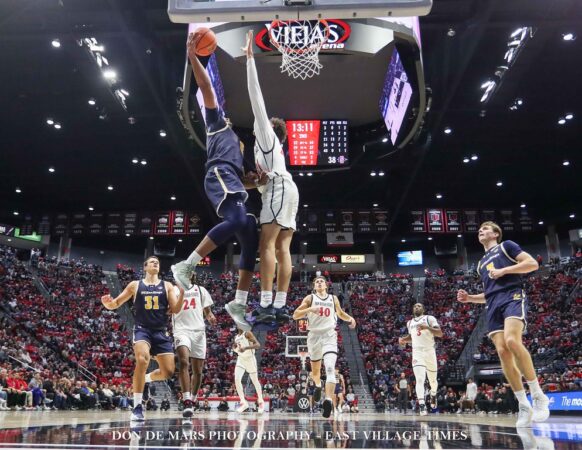
Player of the Game: Miles Byrd
Many factors have contributed to SDSU’s sustained success. Chief among them has been the Aztecs’ elite player development.
Nearly every season, at least one player has made a leap in skill and production. SDSU’s consistency in this regard has made it an expectation. Those who follow the team predict huge improvements from role players the previous season because experience has taught them that is the Aztecs’ norm.
Tony Bland went from a contributor at Syracuse to a star at SDSU after sitting out the 2000-2001 season. Marcus Slaughter leaped from a 7.9 pts, 6.8 rb performer as a true freshman to average 17.8 and 9.0 as a sophomore. Jamaal Franklin made a similar jump in his first two seasons on The Mesa. Malachi Flynn moved from good to great during his year off. Most recently, Jaedon LeDee went from a reserve to an All-American.
After the season’s first game, Byrd appears to be next in line. The redshirt sophomore was sensational on Wednesday. Only Franklin (twice) and Randy Holcomb (once) have approximated Byrd’s 20 point, 8 rebound, 5 steal, and 4 block performance in the program’s history.
Byrd is the only Aztec who played Wednesday and has been with the program for three years. Dutcher’s trust in him was apparent.
He was the last starter taken out in both halves. Dutcher chose him to shoot the game’s only technical free throws. When UCSD went on a run midway through the second half, Dutcher’s solution was to lean on Byrd. The redshirt sophomore only sat 1:07 of the final 20 minutes.
“He’s a dynamic player, so you know his energy is always high,” Dutcher said. “The thing I liked best about Miles today is he only had one turnover. He’s a guy that sometimes gets careless, but he was tight with the ball. He shot it. He’d throw it in there. He made plays, and he took care of the basketball. That was a huge improvement there. … It was good to see him in the first game of his third year in the program step up and make such good plays.”
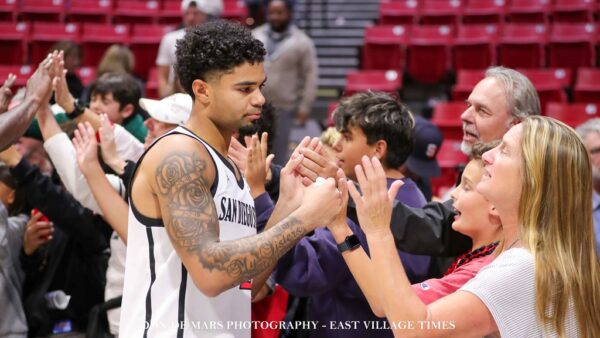
Unsung Hero: Nick Boyd
Nick Boyd’s final stat line was forgettable. He scored 11 points and had four assists, but also turned the ball over four times. Boyd is the unsung hero for the way he elevated his play down the stretch.
Boyd was in the center of action from 4:09 left in the contest to the end of the game. He scored three points, dished two assists, and corralled a rebound. Defensively, he put on a clinic during the span, looking like a veteran Aztec and not someone in his first game with the program. The charge he drew with 49 seconds closed the door on UCSD.
“I thought Nick did a good job, having missed eight weeks, been back, basically three weeks, (to) go out and play 33 minutes,” said Dutcher.
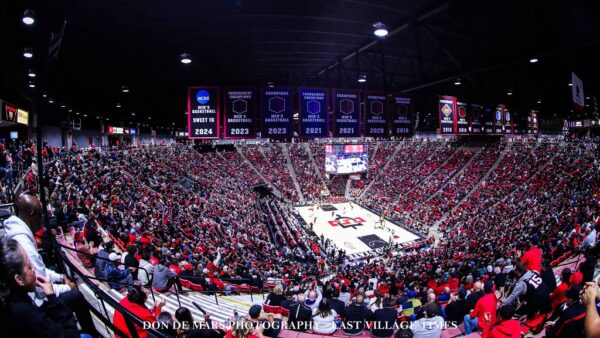
Fast Break:
- Among the superlatives of Byrd’s play was his ability to answer UCSD scores. With 9:09 left in the game, the Tritons made a three to build their largest lead to six. Byrd responded with a three. A few minutes later, UCSD made a layup off a bad turnover from Boyd. Byrd countered with a driving layup.
- SDSU only drew four fouls in the first half compared to UCSD’s eight. In the second, the whistles completely flipped. In the opening 20, Byrd got in foul trouble. When the refs stopped calling as many infractions, Byrd took advantage. He had a steal that is frequently called a reach-in foul. He added a wild block a few minutes later.
- Dutcher ran plays to get Byrd the ball early in the shot clock. SDSU’s sophomore did not bring the ball up, but he was the point guard effectively on many plays. Dutcher said postgame that he wants Byrd to be aggressive in those situations before adding a terrific insight. He said that the young sophomore is playing too much according to the script by passing where the ball is supposed to go instead of creating in the moment.
- The location of the Final Four banner away from the rest is a subtle message of the high expectations for SDSU basketball. A Sweet Sixteen was one of many, but only one stood apart.
- SDSU struggled to score most of the night. One reason for that was its inability to score in one-on-one settings. Dutcher said the defense’s scheme took that away because it made it easy to double the ball. As accurate as that may be, until the team proves capable of scoring while being closely guarded, it’s a question mark for the squad.
- An exception to the above was Pharaoh Compton. He was simply better than his man on two of his three baskets.
- Twenty-two points in the paint offensively will not get it done most nights, but 20 points allowed in the paint will.
- Postgame, Dutcher once again mentioned not playing UCSD because it’s not smart scheduling. This might have been the only aspect of Wednesday that was not traditional Aztec basketball.
- Dutcher mentioned the team’s winning attitude giving them a chance to be good in November, but another concern is being great in conference. Judging from Boise State’s first half against defending Horizon League regular season and tournament champion Oakland, the Broncos will be hard to beat. While SDSU was starting its contest, BSU went into the locker room with a 48-18 halftime lead. The final was 87-43.
- Gwath participated in the jump ball against UCSD. Coleman-Jones did it against San Marcos. UCSD controlled the opening tip.
- In the offseason, assistant JayDee Luster described a “Good to Great” offensive philosophy in which players pass up good shots to create great ones for their teammates. This mentality was not prevalent on Wednesday, but there were teachable moments that should see it occur more frequently moving forward.
- Eight turnovers in the first half were too many. UCSD had eight for the game.
- On Thursday, SDSU’s next opponent, Occidental, defeated DI small college school Southern California Leadership University 81-79 in overtime. The game was not countable because of the differences in level. As long as the Aztecs schedule teams like the DIII Tigers, no one should complain about the 20-game Mountain West schedule.
My earliest sport’s memory involve tailgating at the Murph, running down the circular exit ramps, and seeing the Padres, Chargers and Aztecs play. As a second generation Aztec, I am passionate about all things SDSU. Other interests include raising my four children, being a great husband and teaching high school.